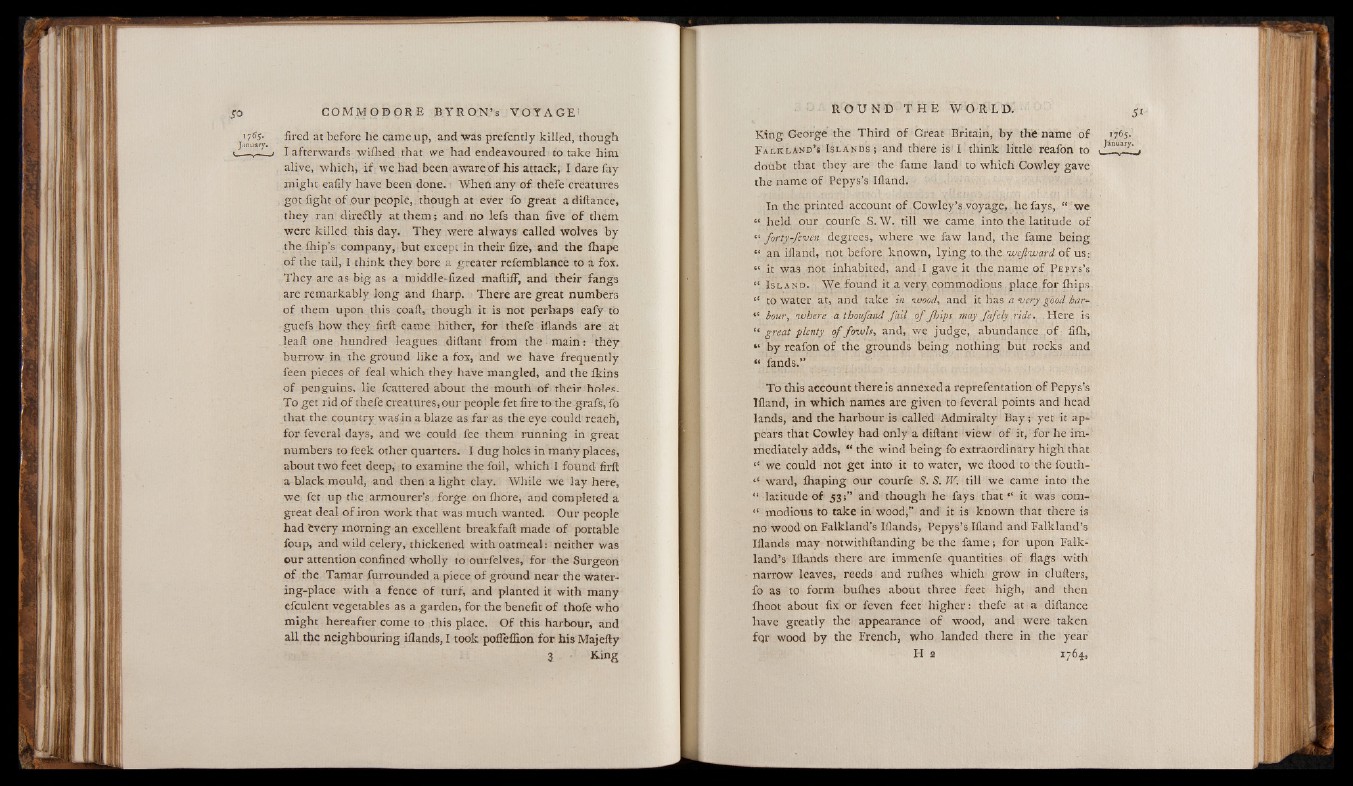
• 76SJanuary.
fired at before he came up, and was prefently killed, though
I afterwards wiftied that we had endeavoured to take him
alive, which, i f we had been aware o f his attack, I dare fay-
might eafily have been done. Wheft any o f thefe creatures
got fight o f Our people,, though at ever fo great a diftance,
they ran directly at them; and no lefs than five o f them
were killed this day. They were always called wolves by
the fhip’s company, but except in their fize, and the lhape
of the tail, I think they bore a greater refemblance to a fox.
They are as b ig a s a middle-fized maftifF, and their fangs
are remarkably long and lharp. There are great numbers
o f them upon this coaft, though it is not perhaps eafy to
guefs how they firft came hither, for thefe iflands are at
lead: one hundred leagues diftant from the ma in : they
burrow in the ground like a fox, and we have frequently
feen pieces o f feal which they have mangled, and the fkins
o f penguins, lie fcattered about the mouth o f their holes.
To get rid o f thefe creatures, our people fet fire to the grafs, fo
that the country was' in a blaze as far as the eye could reach,
for feveral days, and we could fee them running in great
numbers to feek other quarters. I dug holes in many places,
about two feet deep, to examine the foil, which I found firft
a black mould, and then a ligh t clay. While we lay here,
we fet up the armourer’s . forge on Ihore, and completed a
great deal of iron work that was much wanted. Our people
had every morning an excellent breakfaft made o f portable
foup, and wild celery, thickened with oatmeal: neither was
our attention confined wholly to ourfelves, for the Surgeon
o f the Tamar furrounded a piece o f ground near the watering
place with a fence of turf, and planted it with many
efculent vegetables as a garden, for the benefit of thofe who
might hereafter come to this place. Of this harbour, and
all the neighbouring iflands, I took pofieflion for his Majefty
3 - King
King George the Third o f Great Britain, by the name of
F a l k l a n d ’s Islands ; and there is-1 think little reafon to
doubt that they are the fame land to which Cowley gave
the name o f Pepys’s Ifland.
J
In the printed account o f Cowley’s voyage, he fays, “ we
“ held our courfe S. W. till we came into the latitude of
“ forty-feven degrees, where we faw land, the fame being
“ an ifland, not before known, lying to, the vuef-ward o f us;
“ it was not inhabited, and I gave it the name o f Pepys’s
“ Is land. We. found it a very, commodious, place for fhips,
“ to water at, and take in wood, and it has a very good har-
“ hour, where a. thoufand fail ofJlrips. may fafely ride.. .Here is
“ great plenty of fowls, and, we judge, abundance .of filh,
“ by reafon o f the grounds being nothing but rocks and
“ lands.”
To this account there is annexed a reprefentation of Pepys’s
Ifland, in which names are given to feveral points and head
lands, and the harbour is called Admiralty B ay ; yet it appears
that Cowley had only a diftant view o f 1 it, for he immediately
adds, “ the wind being fo extraordinary high that
“ we could not get into it to water, we flood to the fouth-
“ ward, lhaping our courfe S. S. W. till we came into the
“ latitude of 53;” and though he fays that ‘‘ it was com-
“ modious to take in wood,” and it is known that there is
no wood on Falkland’s Iflands, Pepys’s Ifland and Falkland’s
Iflands may notwithftanding be the fame; for upon Falkland’s
Iflands there are immenfe quantities of flags with
narrow leaves, reeds and rulhes which grow in clufters,
fo as to form bulh.es about three feet high, and then
Ihoot about fix or feven feet highe r: thefe at a diftance
have greatly the appearance o f wood, and were taken
fqr wood by the French, who landed there in the year
H 9 1764,